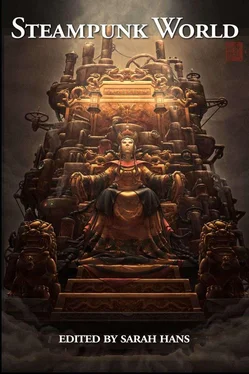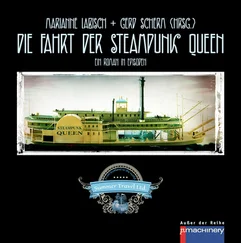When she turned twenty and mastered all the formulae her mistress had to teach, her mother told her, “Go to Bangkok” and she did. Equipped with a fund to establish herself, back then in a more humble house doubling as a shop, just making dolls. She took in Nok, a temple orphan.
Aunrampha found her way into Ging’s workshop, her life, her bed. She was a patron, and then she was more. The skin of a lady, Ging marveled as she stroked over and over that long, soft body during their first times. Behind shut doors Aunrampha’s mouth is not aristocratic, in language or in other uses.
Ging thinks of this now as she lies awake next to Aunrampha, their limbs crisscrossing, a weight of hand on her thigh, a heft of arm across her belly. Aunrampha has had a nielloware glass installed overhead; Ging first objected to it—bad luck—but soon found herself watching, rapt, the tremors and tensing of her own body. Reflected, each act becomes that much more indelible.
A finger draws circles in the bend of her knee. She hates to admit it, but Aunrampha stirs her more sharply than any other ever has. Perhaps it is that months can pass by before they’ve the opportunity to be together this way. The thrill of infrequency, the rarity of Aunrampha’s touch.
“Have you not slept?” Aunrampha pecks her earlobe.
“You’ll take the dolls today.” A dozen, primed to obey.
“I thought we kept those talks out of the bedchamber.” Aunrumpha pushes upright. “Nang Malee… your honored mother taught you, didn’t she, of what happened to Malaya, to Phma, to Yuan? His Majesty—and his revered father before him—strived hard to keep us out of western reach. But negotiation will work only so long.”
“Have you ever put them to the test?” Ging is not sure what makes her ask; she doesn’t want to know. Nevertheless the question is out and she’s not willing to recall it.
Aunrampha’s brow creases. “Do you want to see? Meet me in Sampeng tomorrow, noon, at Taogae Jak’s gold shop.”
In Sampeng, Ging feels foreign. There are women here wearing gipao patterned with cranes and chrysanthemums, who have jade bangles around their wrists rather than silver or brass. Men in vests and tunics, their long hair in queues. It’s not that Ging has never crossed the river, but, though many of her clients are Jeen traders, it’s strange to be among their midst, to hear more Taechew and Jeenglang than Thai.
Taogae Jak’s gold shop is attached to a teahouse, brisk with midday traffic: steamer baskets arriving at and departing from tables with blinding speed, laden with dumplings, chicken feet, seaweed balls. The smell of soy and plum sauces thick in the air. More teacups than Ging has ever seen in one place. And farang patrons: a few merchants, perhaps some dignitaries. But mostly they are soldiers.
Aunrampha has a table to herself. She is in gipao, high collars and gleaming silk embroidered in serpents. Her face is powdered, her eyes kohled and limned gold. She would have been unrecognizable if Ging did not know her face so well, was so familiar with the arrangement of Aunrampha’s brow and jaw.
Between mouthfuls of pork buns, Aunrampha points out a short, bald farang. “He tried to assassinate Phra Ongchao Phannarai. Farangset. Goes by Mathieu Dubois. It’s much like a Somchai or Somying—a name so common it’s almost certainly an alias.”
“There are people named Somchai and Somying,” Ging points out, to be contrary. “Who could wish ill on Phra Ongchao Phannarai?” From what Ging knows, the princess is one of the most inoffensive in the women’s quarters.
“His Majesty has lost two wives. To lose another would… disturb his peace.” Aunrampha nods, lowers her voice. “The farang rents a house at the end of Yuparat. I’ve sent the automata ahead.”
“Does he know who you are?”
“He suspects. Let’s take a walk.” Aunrampha calls for a server in Taechew.
They spend half an hour meandering Sampeng, Aunrampha pointing out favorite eateries, shops, vendors. She shares palace gossip and her suspicion that Phra Ongchao Phannarai may have a fondness for her handmaids that goes beyond propriety. “It’s such a shame,” Aunrampha laments. “Were I serving her directly I could have snared myself a princess.”
Ging pinches her arm. “Don’t go seducing the wives of kings. Isn’t she older?”
“Five years, but there’s a certain charm to older women…” Aunrampha grins; Ging is four years her senior. “Who would know? Handmaids bathe princesses in the night, attire them in the morning. That is the way of things.”
Against her determination to remain somber Ging bites down on a chuckle. “I do not suffice?”
“You’re my first lady and ever will be. Her Highness would be merely the junior spouse.”
In Mathieu Dubois’ Jeen-style house there is redwood furniture, backdrops of nielloware dragons on painted skies, and western watercolors. Leather-bound books with gold lettering Ging can’t read, a map pinned to the wall charting a demarcation of territories Siam has ceded to Farangset.
And five dead farang men on the ink-stained, paper-strewn floorboards.
“They’re just unconscious,” Aunrampha says, nodding at the automata. They stand by a shelf, quietly ornamental. Blank masks for faces, limbs of braided rattan for strength and flexibility, hands of wood and brass, razor fingers.
Ging stares as Aunrampha turns out the men’s pockets, removes their belts, rifles through their clothes. She discards their weapons: knives for fighting and knives for eating, foreign currencies crumpled and clinking. Firearms. Sabers. “Ah.” Aunrampha holds up envelopes, wax-sealed and held together with a knot of twine. “Anna’s. I’ll explain later. Can you take to the balcony? You can watch through the window.”
Not without reservation, Ging obliges, and only because she knows the automata are better protectors than she can ever be. Aunrampha steps away from the bodies and begins making tea. The fragrance of jasmine does not conceal the miasma of blood.
When Mathieu Dubois comes he has his saber drawn: the broken lock has made a surprise impossible. When he sees Aunrampha he gives pause, his fist momentarily slack on the grip of his blade. He snaps out a string of noises, rapid-fire.
Aunrampha smiles up at him. “Monsieur Dubois, I do not speak French. You run errands for an Englishwoman. Unless I know nothing about her at all, I’ll wager she doesn’t condescend to discourse in your tongue.”
The farang does not let go of his weapon.
“Why don’t we sit down and share tea? The leaves are yours. I didn’t have time to poison them.”
“You’ve harmed soldiers of France. For that there will be consequences.” Mathieu sheathes the saber, unholsters a pistol. He does it with smooth ease, and when he points the muzzle at Aunrampha his hand is steady.
Aunrampha waves the envelopes at the farang. “These were handed to you freely, not stolen. Whatever drives you to do favors for Madame Leonowens I don’t really care, but imagine the ambassador’s disappointment to learn that one of his trusted spies consorts with an Englishwoman. He’ll be just so hurt.”
“You overstep yourself. It’s nothing to us to scorch your houses and salt your land as we’ve done to Vietnam.”
“Monsieur.” Aunrampha sips her tea. “Put your silly gun away. Yours is inferior, incidentally. Have you tried Chinese ones? They’re works of art, and their firesmiths don’t sell just to anyone. I’ve heard it said they grind dragon whiskers into gunpowder and sheathe the barrel in kirin scales. Truth or hyperbole, quality speaks for itself.” When the man doesn’t lower his pistol she says in Thai, “Break his arm.”
The dolls obey; the dolls are quick. This much Ging knows. They have practiced, Aunrampha giving them commands to sit or stand, move this way or that, like dogs. They are built for strength and speed, animated by a secret alchemy. A man, even farang, even the agent of a mighty empire—he is only flesh and fat, cartilage and tendons.
Читать дальше












